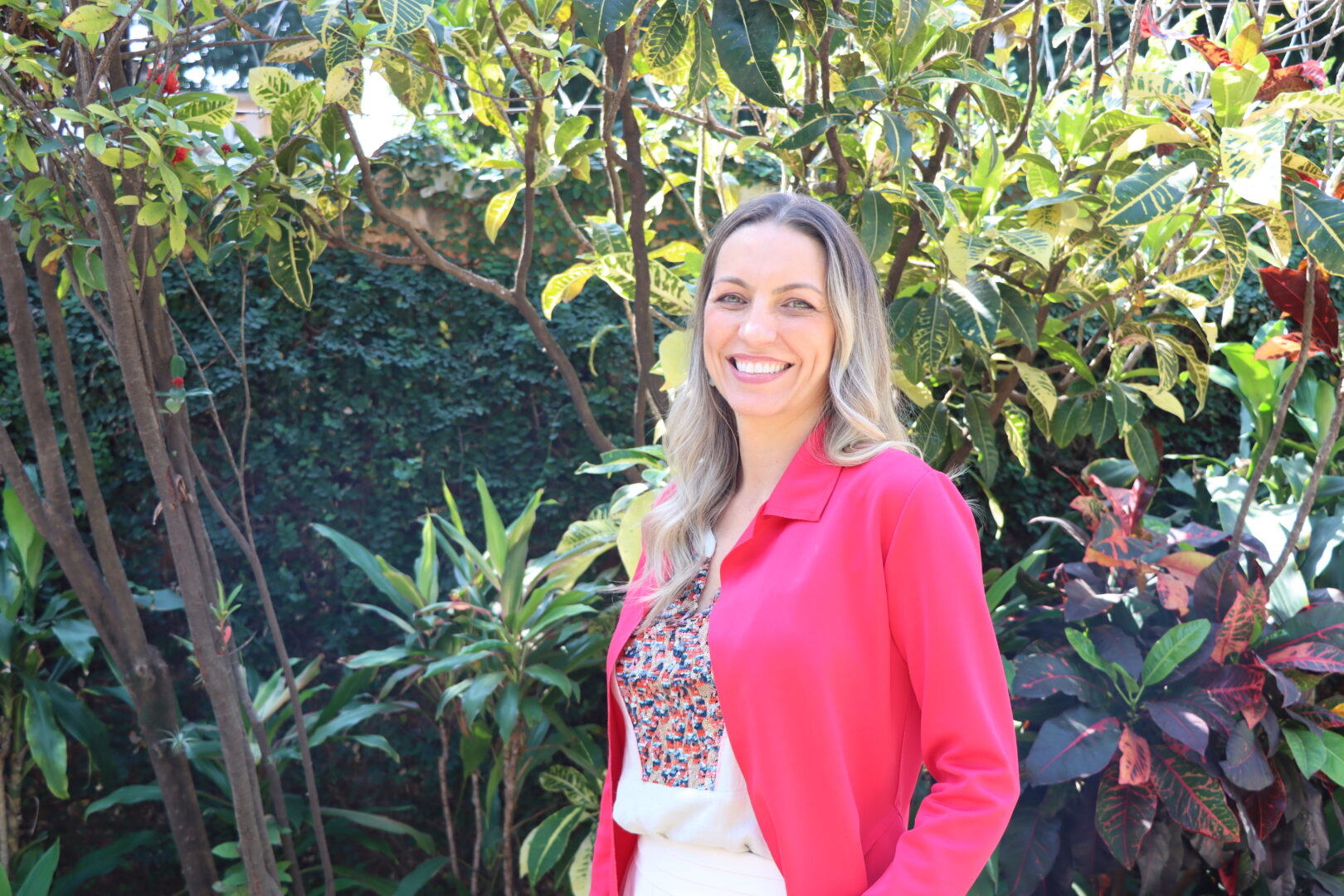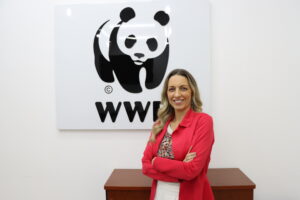
Working at the world’s largest conservation organization might not seem an obvious career path for an MBA graduate, but for Cristianne Close, her role as Deputy Chief Conservation Officer at WWF marries both her business acumen and desire to bring a sense of purpose into her daily work.
The first Argentine woman in IMD’s MBA program – who previously had a fast-paced corporate career at McKinsey, Syngenta, and McDonalds – Close’s vast experience in making value chains more sustainable lends itself well to her current challenge at WWF: trying to protect nature.
Economic activity is the biggest driver of nature loss, with food systems contributing to 70% biodiversity loss on land and 50% in fresh water. This means that protecting nature will require systems change and working hand-in-hand with business leaders on a nature positive agenda. Close says her business background compliments the skillset of her boss who is more of a traditional conservationist.
“I’m a disruptor, not a terrorist,” she said. “I don’t want to destroy business models. I understand the economic feasibility that needs to be there. How do we evolve that? Because ultimately your supply chains depend on nature.”
Close joined WWF in 2017 as Deputy Leader of Food Practice and has worked in various roles to make food systems more sustainable. In her current position as Deputy Global Conservation Director, she helps deliver a common conservation strategy across the WWF network.

One of her successes has been helping to set up the Business for Nature Coalition. It now has more than 2,000 corporate signatures and was instrumental in convincing governments at the UN Biodiversity Conference (COP15) to adopt requirements for all large businesses and financial institutions to assess and disclose their risks, impacts, and dependencies on nature.
She believes the leaders of tomorrow will increasingly need to be well-versed on sustainability topics – from regenerative agriculture to the circular economy and how to transition to greener economies. In the medium term, Close could envision working to make sure board members have the sustainable skillset needed to “shift the Titanic” onto a more sustainable path for the future.
A resilient mindset
Her transition from the corporate to the not-for-profit sector has involved a change of pace and more consensus-based decision-making. In the face of increasing nature loss, resilience is also critical. This summer has seen extreme weather events from wildfires to floods on every continent. “Whatever chart you look at, it’s always bad,” she said. “Your P&L or your objective at the end of the year always looks bad, so you need to learn to maintain your resilience and celebrate minor achievements to give yourself – and your team – enough energy for the rest of the run.”
Resilience is something Close learned from an early age. Growing up in Argentina, a country that has regularly been roiled by hyperinflation and recession, she is no stranger to crisis. “I lived hyperinflation. I know what it is like to go to the supermarket and from the time you enter to when you get to the checkout the prices have changed.”
Close started out at McKinsey, joined a B2B startup during the dotcom boom, worked at an NGO helping entrepreneurs, and by age 28 had become CEO of a Buenos Aires-based fashion brand. Within 18 months she had gotten the brand back in the black by diagnosing and addressing its supply chain issues.
A sense of belonging
At this point, Close decided to hit pause, to reflect on her experience and how she could execute on a bigger scale. She had met IMD MBA graduates in Argentina and found them to be both super smart and down-to-earth. She applied for the last deadline that year.
“I had no idea how I was going to pay for it,” she recalled. “But I said to myself, if I’m smart enough to get in, I’ll be smart enough to find funding.” Close was accepted, offered a scholarship, and became the first woman from Argentina on the program. She sold her car to pay for the rest of her tuition and headed to Lausanne.
One of the main draws for Close was the program’s focus on leadership. She recalls the Mountain Experience at the start of the year where they were filmed for four hours carrying out activities in the snow. Afterwards, they went back to the ‘Dungeons’ ̶ as the MBA study rooms are known ̶ and watched the whole film.
“It was an amazing way of seeing how you perform in teams, what kind of roles you take, and how your stress shows up,” she recalled. “I remember there was a colleague of mine from Greece, and he looked at me and said, ‘Cris, the tone of your voice changes, your pitch changes when you are under stress.’ I had never seen that, and it was painful to watch. It was embarrassing at times, but it was so great to have that candid feedback and, based on that, really work the rest of the year to improve.”
Back in 2007, mental health and emotional well-being were not mainstream business topics. But Close recalled they were very much on the agenda at IMD, where students were given coaching sessions with psychoanalysts and taught about the importance of sleep.
Finally, the program gave her the sense of belonging to a global community of people. “Being a woman from Latin America trying to strive for leadership roles is not the easiest task. You certainly have a lot of doubts about yourself, about your skillset and ability,” she said. “Going there really helped me to see that I can perform at this level. I was top of the class. It was also the first time I got compliments from other women, either on my work, or how I presented myself. I didn’t have that before in Latin America, and I was like: ‘Whoa, we can actually bond!’”
A sustainable switch
Following her MBA, Close briefly worked as a CFO for a jewels and watches firm in Geneva before deciding that she needed to link purpose to her job rather than just working to increase shareholder value. “I always say the MBA kickstarts the thinking process. But it only starts to mature maybe two or even three years later,” she said.
As luck would have it, Jean Paul Lehman, an IMD Professor of International Political Economy at the time, reached out to her with an opportunity to work at agrichemical company Syngenta to develop market access for smallholder farmers. Close moved to Basel and threw herself into the work – which involved travelling to Kenya, India, and Peru to carry out field work, hire local teams, and develop partnerships. “I loved that job because it allowed me to apply my business skills to finding problems around value chains with smallholder farmers and using technology to help improve their livelihoods,” she recalled.
“When the results of your work involve something as decisive as whether a family has food on their table at dinner, it gives you a real responsibility and humbleness.”
Despite her career success, living out of suitcase from week to week made Close feel lonely. So, against the advice of her friends, she quit and decided to return to Argentina where Syngenta created a job for her as Head of the Food Security Agenda for LATAM.
Close married a childhood friend and moved to Brazil for her husband’s job. Syngenta agreed to let her work remotely – something that was rare back in 2011. With a young child at home, she left and joined McDonalds part-time where she worked on making their value chain more sustainable.
Falling in love with nature
She was then approached to set up a foundation to develop a socio-economic gastronomy and eco-tourism project in the Chocó region of Colombia, the second most biodiverse place in the world and also the poorest province in the country which at the time was grappling at the time with violence perpetrated by FARC guerillas.
“That’s where I fell in love with nature because I saw biodiversity,” she said. “I met an amazing group of women and realized I could set up this project, but if the nature around them disappeared, so would their livelihoods. That’s when it clicked for me: I can work for socio-economic development, but nature is critical to our economies, and to our well-being.”
Female empowerment has remained a keen interest for Close. As a mentor and coach at the WWF, she feels passionate about supporting women who want to balance their career and family – something she has personally struggled with. In the medium-term, she could see herself combining her interest in conservation with this passion.
“I grew up with a model that was very different,” she said. “Sometimes I’m my own worst enemy in that I’m the first one to say, ‘I should be at home with the kids,’ or I feel guilty for travelling. I am super passionate about inspiring others to have a balanced life, and female leadership has an empathy element to it that is really useful in the world we’re living in today.”


